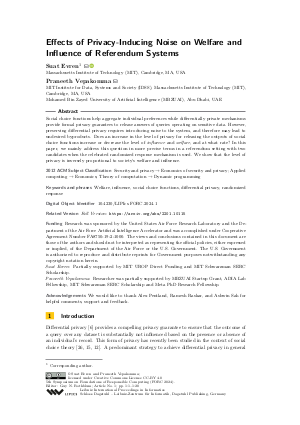LIPIcs.FORC.2024.1.pdf
- Filesize: 0.76 MB
- 20 pages

 Creative Commons Attribution 4.0 International license
Creative Commons Attribution 4.0 International license

Social choice functions help aggregate individual preferences while differentially private mechanisms provide formal privacy guarantees to release answers of queries operating on sensitive data. However, preserving differential privacy requires introducing noise to the system, and therefore may lead to undesired byproducts. Does an increase in the level of privacy for releasing the outputs of social choice functions increase or decrease the level of influence and welfare, and at what rate? In this paper, we mainly address this question in more precise terms in a referendum setting with two candidates when the celebrated randomized response mechanism is used. We show that the level of privacy is inversely proportional to society’s welfare and influence.


























Feedback for Dagstuhl Publishing